Black Men Educators Conference Recap
Key Points
-
BMEC 2021 brought together black male educators and those who support them including school and district leaders, superintendents, nonprofit education leaders, higher education leaders and administrators, education advocates.
-
The goal was to continue building a national multigenerational network of black male educators as a response to historical and contemporary structural and institutional educational inequities and outcomes.
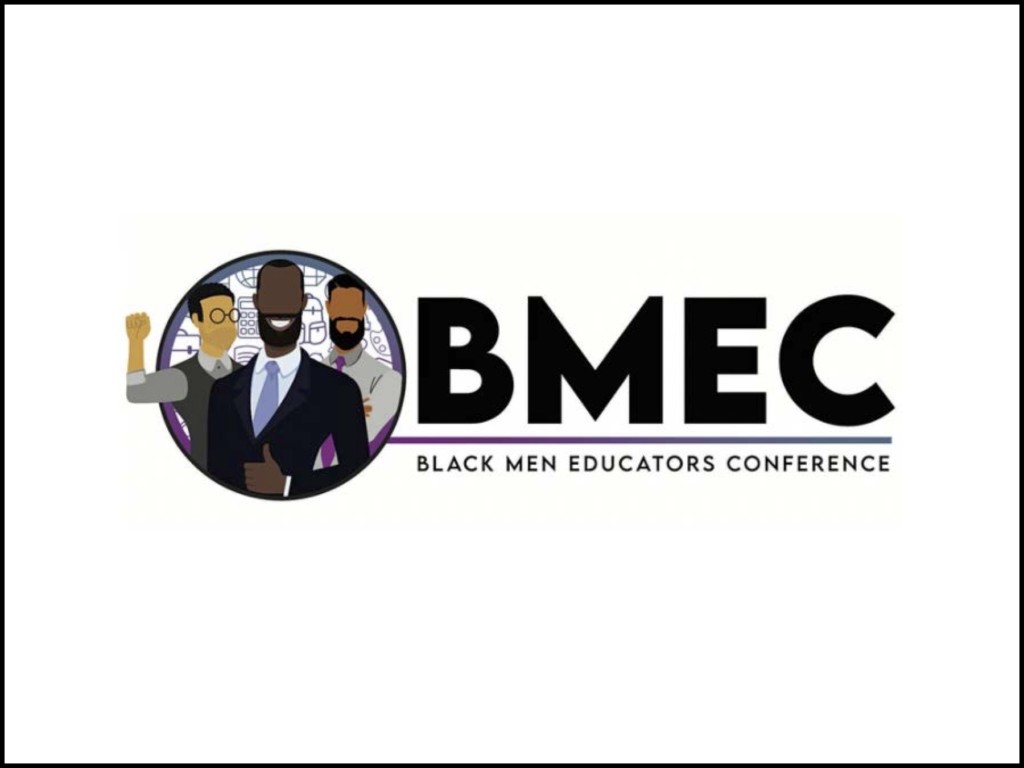
The Black Men Educators Conference (BMEC) 2021, produced and hosted by the Center for Black Educator Development, brought together black male educators and those who support them. This included school and district leaders, superintendents, nonprofit education leaders, higher education leaders and administrators, education advocates, secondary and post-secondary learners, and education policy leaders focusing on deeply provocative and empowering live sessions, workshops, and keynotes delivered by distinguished speakers from across the United States.
Why the emphasis on black-male educators? Emir Davis, a former teacher, principal, district administrator, and the current Director of Black Male Engagement at the Center for Black Educator Development, served as the conference emcee and opened the conference with daunting statistics. “The problem we face is that 2% of educators were black men before the pandemic (2019), and that number has declined to 1.6% in 2021.” These abysmal numbers shed light on a profound lack of inclusion and access that black, indigenous, people of color (BIPOC) have to the education profession in general, while pointing to the specific impact of this systemic issue on black men. The two-day conference was a tour-de-force in awareness, advocacy, and renewal for educators and leaders, laying the foundation of its vision and mission by two deeply impactful keynote speakers.
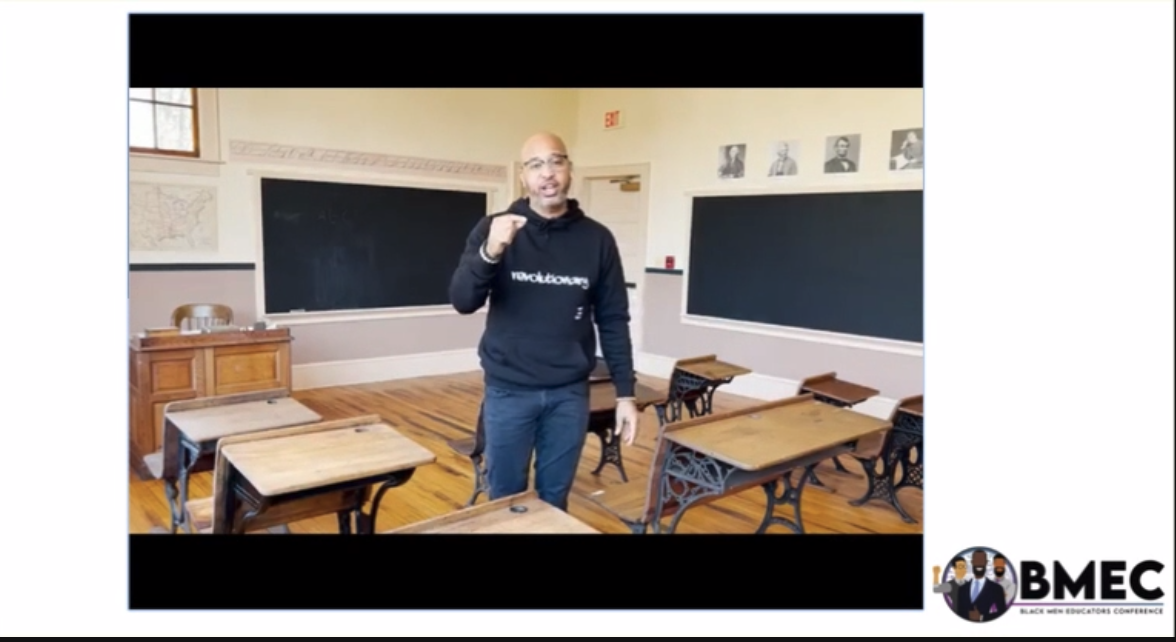
Curtis Valentine delivered the first keynote address. Valentine is the Founder of Real Men Teach, a national campaign to recruit and retain male educators of color by reimagining and reinvesting in the profession. He also serves as Co-Director of the Progressive Policy Institute’s Reinventing America’s Schools Project, an Adjunct Professor at the University of Maryland, College Park. He is in his third term as a Prince George’s County (MD) Board of Education member.
Valentine spoke about the importance of creating equitable access to a high-quality, world-class education for learners of color. He discussed how black parents, educators, learners, and leaders came together historically (and contemporarily) to provide access to the education their children deserve and the abject hurdles intended to squelch and suppress access that accompanied the work. “Black-led schools controlled the education of black kids,” during de jure educational segregation, black parents and leaders came together to build and donate school buildings, supplies, and all other resources to educate their children, which occurred even in schools that sought to integrate, physically, but not curricular-ly.
The aforementioned is a nod to the “false promise of integration,” a particular fact more properly elucidated by a workshop presented by Dr. Jarvis Givens in his deeply relevant and provocative new text, Fugitive Pedagogy, Carter G Woodson, and the Art of Black Teaching (Harvard University Press, 2021). Dr. Givens is an assistant professor at the Harvard Graduate School of Education and a Faculty Affiliate in the African and African American Studies department at Harvard University. He specializes in the history of education, African American history, and theories of race and power in education.
Dr. Givens’ workshop explored themes of resistance in the history of black education, focusing specifically on Dr. Carter G. Woodson and African American teachers through the Jim Crow era. As previously mentioned, this text implicitly discusses arguments apropos the false promise of curricular integration by elucidating examples of black educators in the Jim Crow south that taught texts by Carter G. Woodson in classrooms in defiance of anti-black curricula and other educational resources. Dr. Woodson, the second black man to graduate from Harvard University with a Ph.D. and a lifelong educator, was a central figure in what Dr. Givens terms a fugitive pedagogy that existed for generations among black educators and still impacts education today. Fugitive pedagogy seeks to provide a definitional understanding of “African American physical and intellectual acts that explicitly challenged anti-black protocols of education and domination…”
The problem we face is that 2% of educators were black men before the pandemic (2019), and that number has declined to 1.6% in 2021.
Center for Black Educator Development
Dr. Woodson founded black history month to celebrate blackness, culture — across the diaspora, and so much more. Black educators would surreptitiously teach black history and texts in integrated school buildings, often with the door open because of racist monitoring protocols as an act of defiance, revolution, and epistemic disobedience. “To survive, we have to grow our own. Grow our schools, curriculum, and yes, educators,” Curtis Valentine’s words saliently encapsulate a central point, that the work of educating BIPOC students in a society that seeks to marginalize, erase, and ignore them, their histories, and access to a lever of true liberation, i.e., education, requires the entire community to come together to do everything necessary to ensure every child has access to a high-quality education regardless of zip code or socioeconomic status.
Lorenzo P. Lewis delivered the second keynote address; he is a behavioral health expert who has used his testimony and experience as a foundation for challenging the stigma of mental health issues. Lewis is the founder of The Confess Project, in which the organization facilitates conversations in 13 US cities, specifically for boys and men of color, in barbershops around mental health awareness. Lewis, during his keynote, entitled, “A letter to my younger self,” offered the following, “…We gotta take care of our kids. Them our boys and girls. The village gotta step in — the revolution must go on. How will you be able to go and support and render our young brothers that need us?” 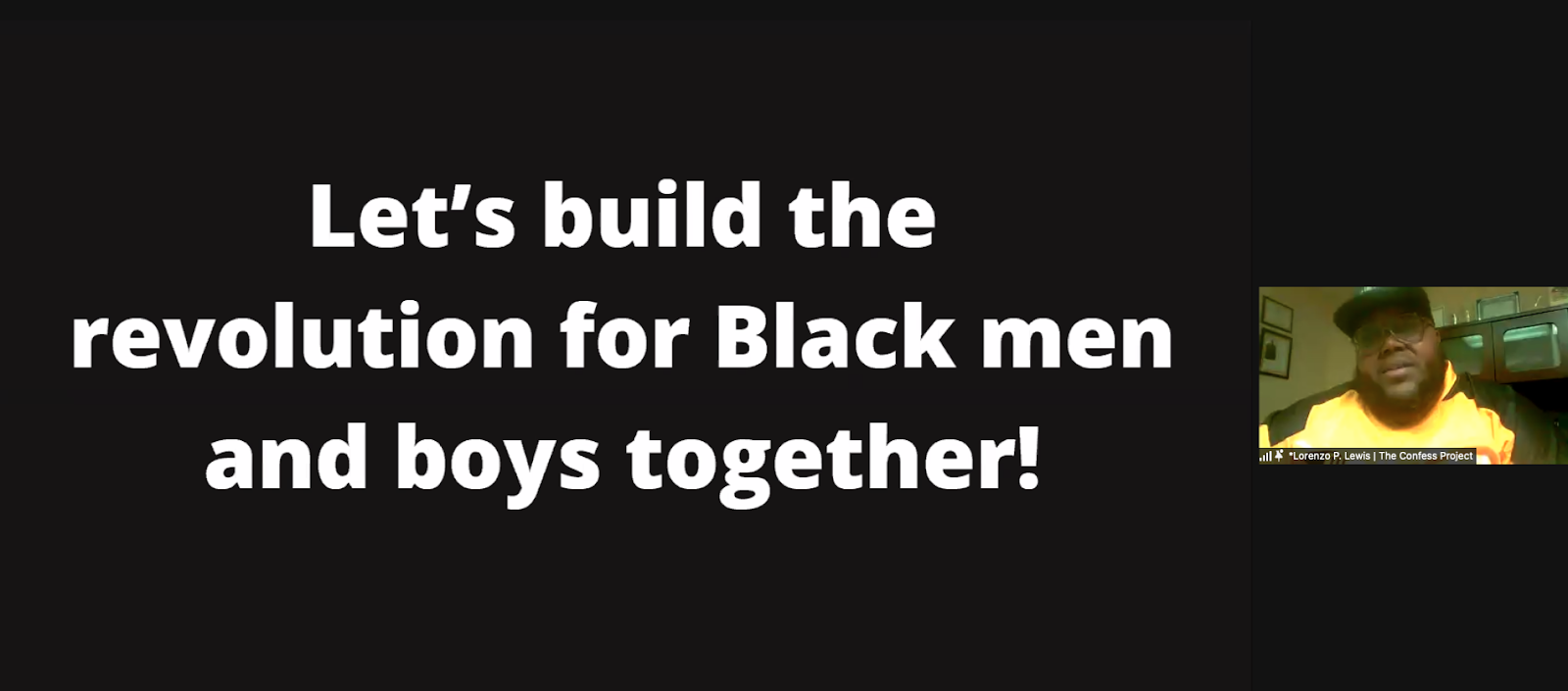
Lewis, as a mental health expert and advocate, does not simply speak of education revolution as the curriculum or hiring and retention practices. He explicitly wants it to encompass mental health for BIPOC learners and educators. Through bold, honest, and deeply personal storytelling, Lewis tells his story of being born in jail to an incarcerated mother, his struggle with depression, anxiety, and anger throughout his youth, to the point of being at-risk for recidivism. This compelling narrative serves as the catalyst and bedrock for The Confess Project, an initiative that confronts the stigma around mental health for men of color.
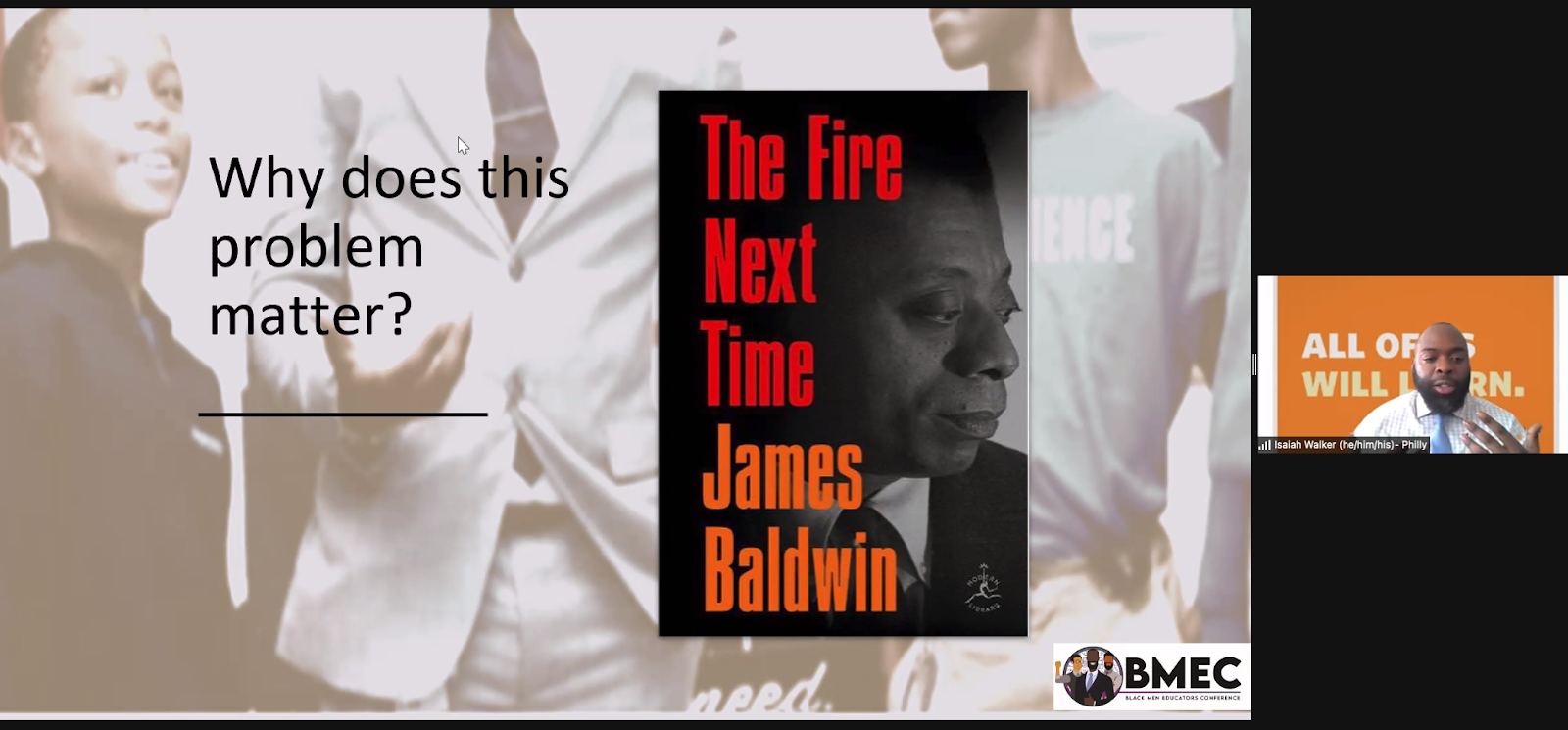
Isaiah R. Walker is principal at KIPP Philadelphia Preparatory Academy where he manages and mentors multiple Principals in Residence (PIR) in Philadelphia. Most recently one of his PIRs has become a school leader this year at one of the KIPP elementary schools. Why does the problem of educator diversity exist? This query posed by Walker is relevant to understanding the issue as a whole and the subtle or siloed elements such as traumatic experiences faced by educators and learners of color.
Walker brings in James Baldwin’s magnum opus, The Fire Next Time, to lay bare his response to anti-black racist education practices and its once de jure and now de facto structural and systemic existence and lingering residue. “The details and symbols of your life have been deliberately constructed to make you believe what white people say about you. Please try to remember that what they believe, as well as what they do and cause you to endure, does not justify your inferiority but to their inhumanity and fear (The Fire Next Time, Baldwin).” The quotation, albeit a fragment, served as the framework for Walker’s workshop on Strategies to Support and Retain BIPOC Educators by Emphasizing Instructional Expertise.
At Walker’s school, he starts with the fundamental belief that their educators – particularly their BIPOC educators – want to be true experts in their craft to provide the very best to their students. They believe – as a leadership team – that their educators are the most dedicated and driven people. Thus, they have a manifest commitment to provide the most comprehensive and robust professional development to their faculty. Walker developed and released a survey for BIPOC male educators at his school to understand their needs and aspirations to provide the most relevant and optimal professional support through the explicit identification of individual developmental needs of its black male faculty. From this, Walker and his team set a standard for professional growth in the building. Walker developed an 80-90-100 model for task planning and learning design, which inherently builds expertise by setting and raising the bar higher (graphic below). Additionally, they held school-based events with families and the broader community about emphasizing high standards of professional growth and instructional expertise to get the whole community involved to ensure the most optimal results for all learners.
The goal of BMEC 2021 is to continue the work of building a national multigenerational network of black male educators as a response to historical and contemporary structural and institutional educational inequities and outcomes. The upshot is to rectify academic and socioemotional outcomes for all learners through enhanced and sustained exposure to high-quality, diverse educators, especially black-male educators. And the buck does not stop there; the organizers and attendees believe that mental-health care is inextricably bound to the overall progress of this movement. “Teaching is a revolutionary act…education is the purest form of activism” perfectly sums up the conference as it denotes the revitalization of “fugitive pedagogical” practices during a time when Critical Race Theory (CRT) is the piece de resistance on the proverbial legislative chopping block across state legislatures in the southern region of the US. More disparagingly, male educator statistics are in a deep declination. So the question is, what can we do to fix the problem?
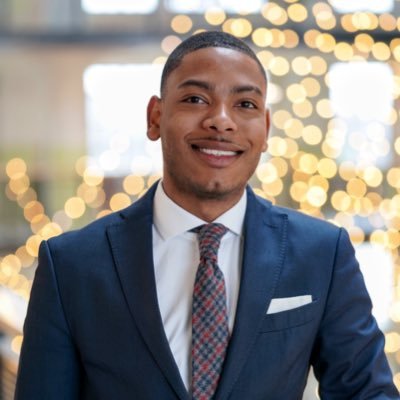






0 Comments
Leave a Comment
Your email address will not be published. All fields are required.